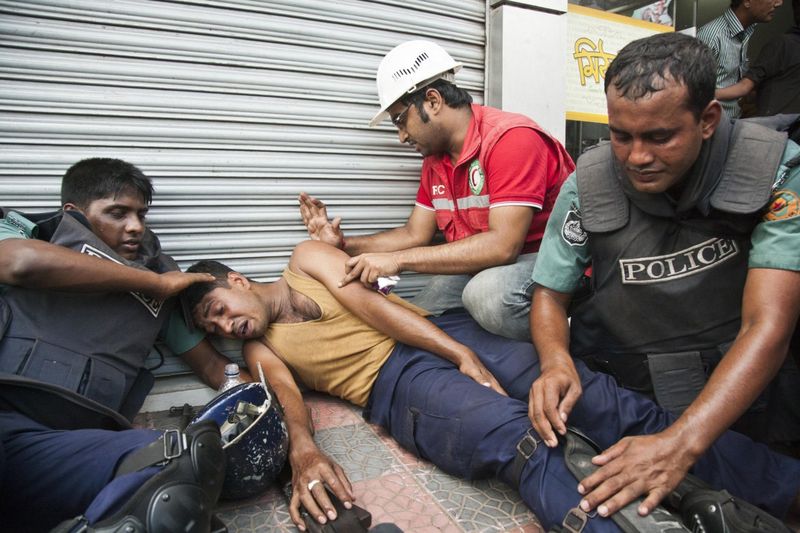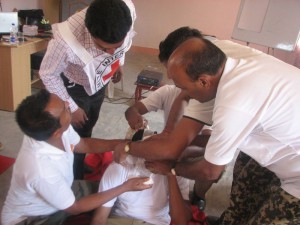As the people of Jammu and Kashmir (J&K) grapple with one of the worst floods in the past many decades, hundreds of first medical responders — essentially volunteers from the Indian Red Cross Society — who have been trained in first aid and basic life-saving techniques across the state are coming to the aid of people affected by the floods.
Experience — including in the recent floods in J&K, and floods last year in Uttarakhand, Assam and Odisha — has shown that prompt first aid and life-saving measures can save lives and reduce the risk of disability. It can prevent medical complications, ease surgical procedures and reduce the risk of disability. It has also shown that appropriate first aid training helps communities and organizations prepare for crises and deal with them more effectively.
To raise awareness on how first aid can save lives in everyday and crisis situations and also to recognize the importance of first responders, the International Red Cross and Red Crescent Movement marks the second Saturday of September every year as World First Aid Day. The day was introduced in 2000 by the International Federation of the Red Cross and Red Crescent (IFRC), which is part of the International Red Cross Red Crescent Movement.
On the occasion this year, the International Committee of the Red Cross (ICRC) has showcased the organization’s work in various countries in a photo gallery with a special focus on Afghanistan, where our colleagues have prepared a short video giving us a glimpse of first aid trainings in the country.
Essentially, first aid is immediate help given to an injured or sick person with available resources before medical aid is obtained. Red Cross and Red Crescent National Societies across the world employ first aid and basic life-saving techniques in situations of armed violence and disasters. To bring first aid to more people, many national societies are focusing on simple life saving skills.
Aware of the need for skilled emergency responders in situations of armed violence and disaster, the ICRC regional delegation in South Asia works along with the Indian Red Cross Society to train and enhance the capacity of first medical responders in many states across India, including J&K. First responders are trained to treat casualties with whatever resources are available on the spot and to assist the wounded and the sick from the site of the incident to the hospital.
First aid has been at the core of the Red Cross Red Crescent Movement ever since Henry Dunant organized civilians to help injured soldiers after the Battle of Solferino in 1859. It’s not only a skill but also an act of humanity. Given without discrimination, it helps empower communities to take greater care of their own survival and well-being.
First aid is not simply providing artificial respiration, bandaging a wound or taking an injured person to hospital. It is also taking someone’s hand, reassuring the frightened and giving a bit of oneself. First aiders are impartial, neutral, independent and not prompted by a desire for gain. Above all, they are humane, as was Henry Dunant, the Movement’s very first first aid worker, on the battlefield of Solferino.
Resources:
Video: First aid training in Afghanistan
In Afghanistan, between January and June 2014, the ICRC gave first aid training to 1,347 arms carriers, medical personnel, and taxi drivers to help them to save lives. The ICRC also supports the activities of the Afghan Red Crescent Society. From January to June 2014 volunteers from the Afghan Red Crescent Society administered first aid to over 51,000 people.
Photo gallery: First Aid Saves Lives
First aid: No magic, only skill, will and a piece of cloth
Ukraine: Training of first-aid instructors geared to emergencies
South Sudan: Life-saving first aid
ICRC New Delhi



